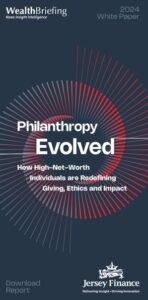This report presents the findings of a three-month study that explores the relationship between high-net-worth (HNW) individuals and philanthropy, commissioned by Jersey Finance and executed by WealthBriefing. The research involved detailed discussions with distinguished wealth professionals from Europe and South Africa. While the vast scale and complexity of this phenomenon preclude exhaustive analysis, this report offers a valuable synthesis of current insights, attitudes and experiences from those who advise HNWIs and the charitable organisations that seek their engagement.
The study contains an exhaustive examination of practitioners’ perceptions of the future of philanthropy. It asks whether estate-planning structures, such as charitable foundations and trusts, provide good frameworks for ordered charitable giving – the answer, somewhat surprisingly, is not an unequivocal ‘yes.’
We also explore the reluctance of foundations to step too far into the public spotlight for fear of being overwhelmed by requests for money, the increasing preference among HNW philanthropists for tackling the root causes of social problems rather than restricting themselves to fighting the symptoms and the crossovers between impact investing (in expectation of eventual profits) and general philanthropy.
The question of how different generations within HNW families influence each other’s charitable giving and/or encourage each other to involve themselves in philanthropy is a fascinating one. Examples abound of next-generation (under 40) HNWIs choosing to invest their wealth in more ethical ways than their elders, but there are also examples of their elders influencing their charitable habits as well. Sometimes, the patriarch of a wealthy family tries to use the family charity as a means of drawing his offspring into the family business. At other times, the younger members of a family succeed in persuading their elders to make ethical investments and pull their money out of tobacco, oil, weapons and other frequent targets of abhorrence. At all times, there are examples of crossovers, not least regarding trends in charitable giving/impact investment in line with ESG (environmental, social and governance-oriented) goals.
The survey also uncovers the likelihood that some jurisdictions contain more philanthropic female HNWIs who invest in and/or donate to altruistic causes and entities than male donors. HNW husbands and wives appear to be collaborating with one another more frequently in their approach to philanthropy. Problems in reporting, disclosure and evidencing ‘impact’ are discussed, along with the likelihood that artificial intelligence (AI) will one day revolutionise the philanthropy industry – although it is not doing so yet. Whether you are a fund manager, a wealth manager, a relationship manager, a legal or accounting
professional or an HNW donor, this report contains something that will fascinate you.

